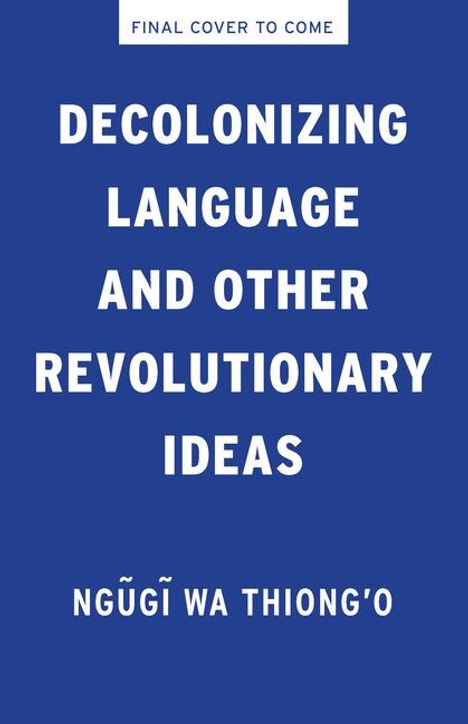Ngugi Wa Thiong'O: Decolonizing Language and Other Revolutionary Ideas, Gebunden
Decolonizing Language and Other Revolutionary Ideas
(soweit verfügbar beim Lieferanten)
- Verlag:
- New Press, 05/2025
- Einband:
- Gebunden
- Sprache:
- Englisch
- ISBN-13:
- 9781620979327
- Artikelnummer:
- 11924100
- Umfang:
- 224 Seiten
- Gewicht:
- 322 g
- Maße:
- 191 x 133 mm
- Stärke:
- 14 mm
- Erscheinungstermin:
- 6.5.2025
- Hinweis
-
Achtung: Artikel ist nicht in deutscher Sprache!
Klappentext
A Literary Hub Most Anticipated Book
Brilliant thoughts on modern African literature and postcolonial literary criticism from one of the giants of contemporary letters
"One of the greatest writers of our time." --Chimamanda Ngozi Adichie, bestselling author
Ngũgĩ wa Thiong'o was a towering figure in African literature, and his novels A Grain of Wheat ; Weep Not, Child ; and Petals of Blood are modern classics. Emerging from a literary scene that flourished in the 1950s and '60s during the last years of colonialism in Africa, he became known not just as a novelist--one who, in the late '70s, famously stopped writing novels in English and turned to the language he grew up speaking, Gĩkũyũ--but as a major postcolonial theorist.
In Decolonizing Language and Other Revolutionary Ideas, Ngũgĩ gives us a series of essays that build on the revolutionary ideas about language and its constructive role in national culture, history, and identity that he set out in his earlier work--illuminating the intrinsic importance of keeping intact and honoring these native languages throughout time.
Intricate and deeply nuanced, this collection examines the enduring power of African languages in resisting both the psychic and material impacts of colonialism, past and present. These themes are elucidated through chapters on some contemporaries of Ngũgĩ wa Thiong'o, including Chinua Achebe, Mĩcere Gĩthae Mũgo, and Wole Soyinka--each offering a distinct lens on the liberatory potential of language.
A brave call for discourse and immensely relevant to our present moment, Decolonizing Language and Other Revolutionary Ideas works both as a wonderful introduction to the enduring themes of Ngũgĩ's work as well as a vital addition to the library of the world's greatest and most provocative writers.

